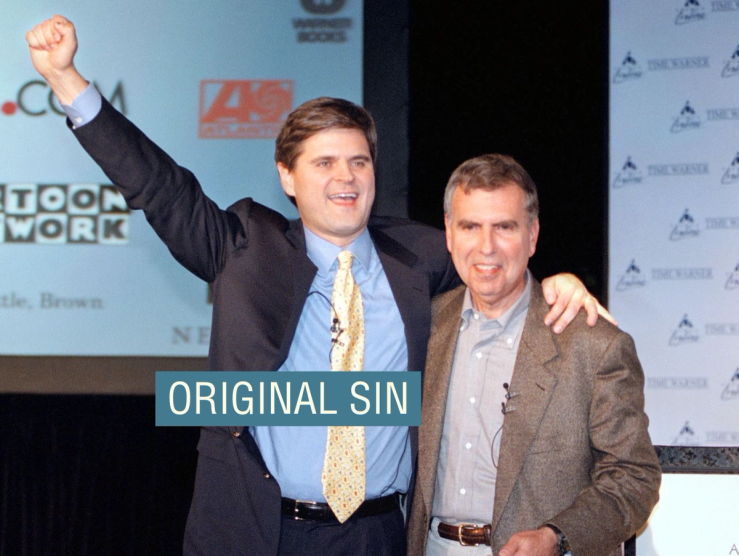The Scene
Warner Bros. Discovery’s split is the latest proof that conglomerates are deeply out of fashion.
Glomming diverse operations together smooths out profits through business cycles. It mutualizes economic risk. But it also mutualizes scandal, tainting a corporate empire with the real or perceived sins of one subsidiary. And with President Donald Trump looking for points of leverage, corporate sprawl is a real liability.
ABC, CBS, CNN, and MSNBC are blips on the bottom lines of Warner Bros., Disney, Paramount, and Comcast. But they’re lightning rods for controversy — Trump has sued two of those channels and complains constantly about the other two — and suck up executives’ time and attention. News channels were never cash cows, but at least they were trophy assets that were fun to own. Not so much these days.
It’s not just the president: These companies’ broad footprints leave no easy choices in the culture wars. Hollywood talent, middle-America cruise passengers, coders building streaming apps, and the guy installing your cable all get mad about different things. Conglomerates have lots of ways to get in trouble.
This isn’t entirely a new problem. In 1996, Martin Scorsese was shopping a movie about the Dalai Lama. Universal Studios, which was owned by Seagram at the time, passed. “I don’t need to have my spirits and wine business thrown out of China,” then-CEO Edgar Bronfman said. His fears were well-founded, and a preview of what we’re seeing now: Disney made the movie, Kundun, and landed on a Chinese blacklist that threatened the opening of its Shanghai theme park.
Breakups like those announced by Warner Bros. Discovery and Comcast might be freeing for both sides. The next time Trump criticizes MSNBC, he can’t threaten Comcast with (hypothetically) OSHA agents descending on Universal Orlando. Mark Lazarus, who will run Comcast’s new cable spinoff, will be more exposed to political pressure without a corporate parent. But he can decide what to put on MSNBC without wondering what it will do to Harry Potter theme parks.
Know More
For the second time in seven years and the third time this century, a company that bought the Warner Bros. entertainment empire wishes it had not. Failures to foresee tectonic changes — and the lure of media moguldom — has turned one of the most storied names in Hollywood into a dealmaking albatross.
The split unwinds the 2022 merger of CNN and HBO owner WarnerMedia with Discovery, a jumble of cable channels offering humbler fare. It was a bet that content companies needed to be bigger to compete with Netflix, and that consumers would want to watch White Lotus, Anderson Cooper’s war zone dispatches, and 90 Day Fiancé in the same place.
Its previous owner, AT&T, bought what was then called Time Warner in 2018 for about $100 billion, including debt, and almost immediately regretted it. In 2021, it struck a deal to sell it to Discovery for a package of cash and stock worth about $43 billion — a roughly $40 billion writedown (AT&T has disputed the latter number.) Go back further, and its predecessor was party to what is widely considered the worst corporate merger in history, the union of AOL and Time Warner in 2001.
Step Back
The M&A math is a bit hard to decipher, but a business worth around $100 billion to AT&T seven years ago is now roughly half of Warner Bros. Discovery, which trades at $24 billion today. It’s not even the good half: Cable is in long-term decline, and CEO David Zaslav’s parting gift to SpinCo is a 20% stake in the more valuable studio and streaming businesses that will stay behind.
Why do companies keep getting this so wrong? After all, Netflix launched its streaming service in 2007, and Bob Iger first sounded the alarm about cord-cutting in 2015. AOL presaged the confluence of tech and media, but broadband killed dial-up and the dot-com bubble burst. AT&T, too, was onto something when it aimed to deliver shows directly to people’s phones. But it was outmaneuvered by nimbler streamers, slowed down by a creaking debt load, culture clashes, and the Justice Department. Tech giants like Amazon have paid up for sports rights, a key part of the cable bundle. The result is a cable business melting faster than bosses expected.
Notable
- The winner in all this? Rupert Murdoch, who agreed to sell 21st Century Fox — a collection of cable channels plus a movie studio, more or less identical to Warner Bros. — to Disney for $71 billion in 2017, at what would prove to be the top.


